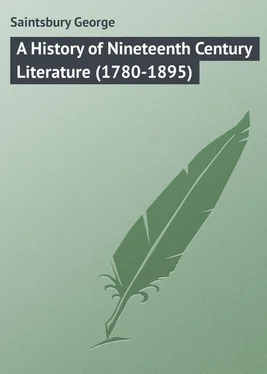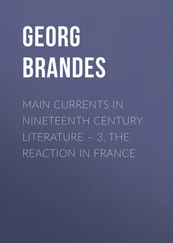George Saintsbury - A History of Nineteenth Century Literature (1780-1895)
Здесь есть возможность читать онлайн «George Saintsbury - A History of Nineteenth Century Literature (1780-1895)» — ознакомительный отрывок электронной книги совершенно бесплатно, а после прочтения отрывка купить полную версию. В некоторых случаях можно слушать аудио, скачать через торрент в формате fb2 и присутствует краткое содержание. ISBN: , Жанр: foreign_prose, на английском языке. Описание произведения, (предисловие) а так же отзывы посетителей доступны на портале библиотеки ЛибКат.
- Название:A History of Nineteenth Century Literature (1780-1895)
- Автор:
- Жанр:
- Год:неизвестен
- ISBN:http://www.gutenberg.org/ebooks/31698
- Рейтинг книги:5 / 5. Голосов: 1
-
Избранное:Добавить в избранное
- Отзывы:
-
Ваша оценка:
- 100
- 1
- 2
- 3
- 4
- 5
A History of Nineteenth Century Literature (1780-1895): краткое содержание, описание и аннотация
Предлагаем к чтению аннотацию, описание, краткое содержание или предисловие (зависит от того, что написал сам автор книги «A History of Nineteenth Century Literature (1780-1895)»). Если вы не нашли необходимую информацию о книге — напишите в комментариях, мы постараемся отыскать её.
A History of Nineteenth Century Literature (1780-1895) — читать онлайн ознакомительный отрывок
Ниже представлен текст книги, разбитый по страницам. Система сохранения места последней прочитанной страницы, позволяет с удобством читать онлайн бесплатно книгу «A History of Nineteenth Century Literature (1780-1895)», без необходимости каждый раз заново искать на чём Вы остановились. Поставьте закладку, и сможете в любой момент перейти на страницу, на которой закончили чтение.
Интервал:
Закладка:
Although opinions about Byron differ very much, there is one point about him which does not admit of difference of opinion. No English poet, perhaps no English writer except Scott (or rather "The Author of Waverley"), has ever equalled him in popularity at home; and no English writer, with Richardson and Scott again as seconds, and those not very close ones, has equalled him in contemporary popularity abroad. The vogue of Byron in England, though overpowering for the moment, was even at its height resisted by some good judges and more strait-laced moralists; and it ebbed, if not as rapidly as it flowed, with a much more enduring movement. But abroad he simply took possession of the Continent of Europe and kept it. He was one of the dominant influences and determining causes of the French Romantic movement; in Germany, though the failure of literary talent and activity of the first order in that country early in this century made his school less important, he had great power over Heine, its one towering genius; and he was almost the sole master of young Russia, young Italy, young Spain, in poetry. Nor, though his active and direct influence has of course been exhausted by time, can his reputation on the Continent be said to have ever waned.
These various facts, besides being certain in themselves, are also very valuable as guiding the inquirer in regions which are more of opinion. The rapidity of Byron's success everywhere, the extent of it abroad (where few English writers before him had had any at all), and the decline at home, are all easily connected with certain peculiarities of his work. That work is almost as fluent and facile as Scott's, to which, as has been said, it owes immense debts of scheme and manner; and it is quite as faulty. Indeed Scott, with all his indifference to a strictly academic correctness, never permitted himself the bad rhymes, the bad grammar, the slipshod phrase in which Byron unblushingly indulges. But Byron is much more monotonous than Scott, and it was this very monotony, assisted by an appearance of intensity, which for the time gave him power. The appeal of Byron consists very mainly, though no doubt not wholly, in two things: the lavish use of the foreign and then unfamiliar scenery, vocabulary, and manners of the Levant, and the installation, as principal character, of a personage who was speedily recognised as a sort of fancy portrait, a sketch in cap and yataghan, of Byron himself as he would like to be thought. This Byronic hero has an ostentatious indifference to moral laws, for the most part a mysterious past which inspires him with deep melancholy, great personal beauty, strength, and bravery, and he is an all-conquering lover. He is not quite so original as he seemed, for he is in effect very little more than the older Romantic villain-hero of Mrs. Radcliffe, the Germans, and Monk Lewis, costumed much more effectively, placed in scheme and companionship more picturesquely, and managed with infinitely greater genius. But it is a common experience in literary history that a type more or less familiar already, and presented with striking additions, is likely to be more popular than something absolutely new. And accordingly Byron's bastard and second-hand Romanticism, though it owed a great deal to the terrorists and a great deal more to Scott, for the moment altogether eclipsed the pure and original Romanticism of his elders Coleridge and Wordsworth, of his juniors Shelley and Keats.
But although the more extreme admirers of Byron would no doubt dissent strongly from even this judgment, it would probably be subscribed, with some reservations and guards, by not a few good critics from whom I am compelled to part company as to other parts of Byron's poetical claim. It is on the question how much of true poetry lies behind and independent of the scenery and properties of Byronism, that the great debate arises. Was the author of the poems from Childe Harold to Don Juan really gifted with the poetical "sincerity and strength" which have been awarded him by a critic of leanings so little Byronic in the ordinary sense of Matthew Arnold? Is he a poetic star of the first magnitude, a poetic force of the first power, at all? There may seem to be rashness, there may even seem to be puerile insolence and absurdity, in denying or even doubting this in the face of such a European concert as has been described and admitted above. Yet the critical conscience admits of no transaction; and after all, as it was doubted by a great thinker whether nations might not go mad like individuals, I do not know why it should be regarded as impossible that continents should go mad like nations.
At any rate the qualities of Byron are very much of a piece, and, even by the contention of his warmest reasonable admirers, not much varied or very subtle, not necessitating much analysis or disquisition. They can be fairly pronounced upon in a judgment of few words. Byron, then, seems to me a poet distinctly of the second class, and not even of the best kind of second, inasmuch as his greatness is chiefly derived from a sort of parody, a sort of imitation, of the qualities of the first. His verse is to the greatest poetry what melodrama is to tragedy, what plaster is to marble, what pinchbeck is to gold. He is not indeed an impostor; for his sense of the beauty of nature and of the unsatisfactoriness of life is real, and his power of conveying this sense to others is real also. He has great, though uncertain, and never very fine , command of poetic sound, and a considerable though less command of poetic vision. But in all this there is a singular touch of illusion, of what his contemporaries had learnt from Scott to call gramarye. The often cited parallel of the false and true Florimels in Spenser applies here also. The really great poets do not injure each other in the very least by comparison, different as they are. Milton does not "kill" Wordsworth; Spenser does not injure Shelley; there is no danger in reading Keats immediately after Coleridge. But read Byron in close juxtaposition with any of these, or with not a few others, and the effect, to any good poetic taste, must surely be disastrous; to my own, whether good or bad, it is perfectly fatal. The light is not that which never was on land or sea; it is that which is habitually just in front of the stage: the roses are rouged, the cries of passion even sometimes (not always) ring false. I have read Byron again and again; I have sometimes, by reading Byron only and putting a strong constraint upon myself, got nearly into the mood to enjoy him. But let eye or ear once catch sight or sound of real poetry, and the enchantment vanishes.
Attention has already been called to the fact that Byron, though generally ranking with the poets who have been placed before him in this chapter as a leader in the nineteenth century renaissance of poetry, was a direct scholar of Scott, and in point of age represented, if not a new generation, a second division of the old. This was still more the case in point of age, and almost infinitely more so in point of quality, as regards Shelley and Keats. There was nothing really new in Byron; there was only a great personal force directing itself, half involuntarily and more than half because of personal lack of initiative, into contemporary ways. The other two poets just mentioned were really new powers. They took some colour from their elders; but they added more than they took, and they would unquestionably have been great figures at any time of English literature and history. Scott had little or no influence on them, and Wordsworth not much; but they were rather close to Coleridge, and they owed something to a poet of much less genius than his or than their own – Leigh Hunt.
Percy Bysshe Shelley, the elder of the two, was Byron's junior by four years, and was born at Field Place in Sussex in August 1792. He was the heir of a very respectable and ancient though not very distinguished family of the squirearchy; and he had every advantage of education, being sent to Eton in 1804, and to University College, Oxford, six years later. The unconquerable unconventionality of his character and his literary tastes had shown themselves while he was still a schoolboy, and in the last year of his Etonian and the first of his Oxonian residence he published two of the most absurd novels of the most absurd novel kind that ever appeared, Zastrozzi and St. Irvyne , imitations of Monk Lewis. He also in the same year collaborated in two volumes of verse, The Wandering Jew (partly represented by Queen Mab ), and " Poems by Victor and Cazire" (which has vindicated the existence of reviewers by surviving only in its reviews, all copies having mysteriously perished). His stay at Oxford was not long; for having, in conjunction with a clever but rather worthless friend, Thomas Jefferson Hogg (afterwards his biographer), issued a pamphlet on "The Necessity of Atheism" and sent it to the heads of colleges, he was, by a much greater necessity, expelled from University on 25th March 1811. Later in the same year he married Harriet Westbrook, a pretty and lively girl of sixteen, who had been a school-fellow of his sister's, but came from the lower middle class. His apologists have said that Harriet threw herself at his head, and that Shelley explained to her that she or he might depart when either pleased. The responsibility and the validity of this defence may be left to these advocates.
Читать дальшеИнтервал:
Закладка:
Похожие книги на «A History of Nineteenth Century Literature (1780-1895)»
Представляем Вашему вниманию похожие книги на «A History of Nineteenth Century Literature (1780-1895)» списком для выбора. Мы отобрали схожую по названию и смыслу литературу в надежде предоставить читателям больше вариантов отыскать новые, интересные, ещё непрочитанные произведения.
Обсуждение, отзывы о книге «A History of Nineteenth Century Literature (1780-1895)» и просто собственные мнения читателей. Оставьте ваши комментарии, напишите, что Вы думаете о произведении, его смысле или главных героях. Укажите что конкретно понравилось, а что нет, и почему Вы так считаете.












